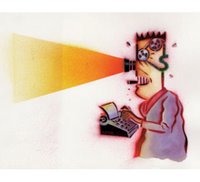Ed Gonzalez at
Slant Magazine states that:
Mulholland Drive, possibly the greatest work of American film art since Altman's Nashville, is an impossible act for Lynch to have to follow, but the bug-eyed director—pupils dilated and imagination tripping in almost inconceivable directions—has made the Atlas Shrugged of narrative avant-garde films, compulsively watchable and insanely self-devouring.
UPDATE: Steve Sailer attempts to break it all down for the casual viewer in a way that no other critic has been bold enough to do:
The basic structure of the film is promising, resembling the setup for a complicated Tom Stoppard play. Dern plays a classy Hollywood actress married to a jealous Polish millionaire. She lands a big role in a Southern Gothic film about adulterous lovers and the husband who will kill them if he finds out. Her leading man is a Colin Farrell-type star notorious for sleeping with all his leading ladies, especially the married ones. Not surprisingly, you soon can't tell whether the love scenes depict the characters in the film-within-a-film, or whether the stars are rehearsing a little too realistically in their spare time.
Considerately, Lynch has characters clue the audience in on what will happen, such as a sinister Polish hag who visits Dern in her LA mansion and tells her that her upcoming romance film is actually about murder, or maybe she just forgot, but who can remember, she asks, what comes before what, whether it's today, yesterday, or tomorrow?
The director (Jeremy Irons) reveals that the new movie is actually a remake of a Polish movie, based on a Polish Gypsy folktale, about adulterous lovers that was begun in the 1930s but never finished because the two stars were murdered, presumably by a jealous husband. And there's suppose to be a Gypsy curse on the whole proceedings.
Then, Dern somehow becomes, like Billy Pilgrim in
Slaughterhouse 5, unstuck in time (or maybe she's just crazy) and is soon encountering scenes both from the unfinished Polish movie and from the private lives of the doomed Polish actors.
So far, so good. A half hour into the film, my hopes were high. But then … the story never develops any momentum. And it just goes on and on and on forever and a day. You know the last ten minutes of "2001," where the astronaut keeps walking into strange rooms, staring in puzzlement at different versions of himself? Well, multiply that by 18 and you'll grasp what this three-hour disaster is like: Laura Dern walking into scores of rooms and staring in horror at what she sees. But there isn't much that's all that horrible to look at, so the film doesn't even offer the amusements of a horror film. The soundtrack consists of endless minor key chords and thump-thump heartbeat-like percussion, which is pretty creepy for awhile, but gets old eventually.
Lynch himself seems to get bored with this, and keeps introducing characters that don't fit into his already overstuffed four-level structure. Dern re-emerges as a foul-mouthed skank who apparently lives in Pomona, in the "Inland Empire" east of LA, and is married to a man from Poland (which was an inland country, except for the controversial Danzig corridor, when the original movie was made between the wars -- see how the Pomona-Poland Inland Empire theme all fits together!), who runs off to join a Baltic circus to care for the animals. And then there are scenes from a Polish sitcom starring a stiffly dressed bourgeois family with the heads of rabbits, which I guess is tied into the recurrent theme of being good with animals, which also pops up in the ten minute monologue by a Chinese homeless lady sitting on the star-engraved sidewalk of Hollywood Blvd., who talks at vast length about her friend in Pomona who is retiring from turning tricks to stay home with her pet monkey.
This isn't as random as it sounds because every damn thing in the movie is foretold earlier. For example, in Dern's second incarnation, as the whore, she delivers a long monologue to a Hollywood private eye (who looks kind of like, rather improbably for a shamus, Matthew Yglesias) in which, in the course of talking about some guy she once knew, she mentions that he had a one-legged sister. About an hour later, as I was walking out early, about 170 minutes into this ordeal, up on the screen -- well, what do you know! -- there's suddenly a one-legged woman.
To be honest, I'm often a big admirer of films constructed in this manner. I imagine that if I sat through "Inland Empire" again, I could explain why, say, "Repo Man" is art while "Inland Empire" is an obsessive-compulsive nightmare / snoozeathon, but no way in hell am I going to subject myself to it another time.
Like Peter Jackson's interminable "King Kong," what's being debuted in the theatres is the three-hour Director's Cut. Hopefully, someday there will be a two-hour Editor's Cut of "Inland Empire."
 Doree Shafrir from Slate.com considers the question:
Doree Shafrir from Slate.com considers the question:
